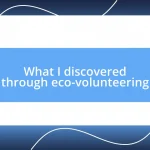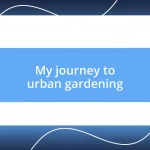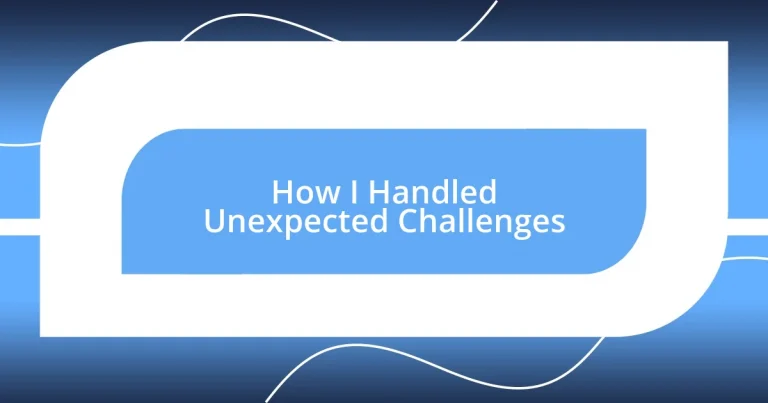Key takeaways:
- Recognizing unexpected challenges involves being attentive to changes in our environment and emotions, allowing for proactive responses rather than reactive panic.
- Building a flexible mindset enables one to embrace changes and adapt strategies, turning setbacks into opportunities for growth and innovation.
- Sharing insights and experiences with others fosters community, provides support, and helps in reframing challenges through collective understanding and humor.
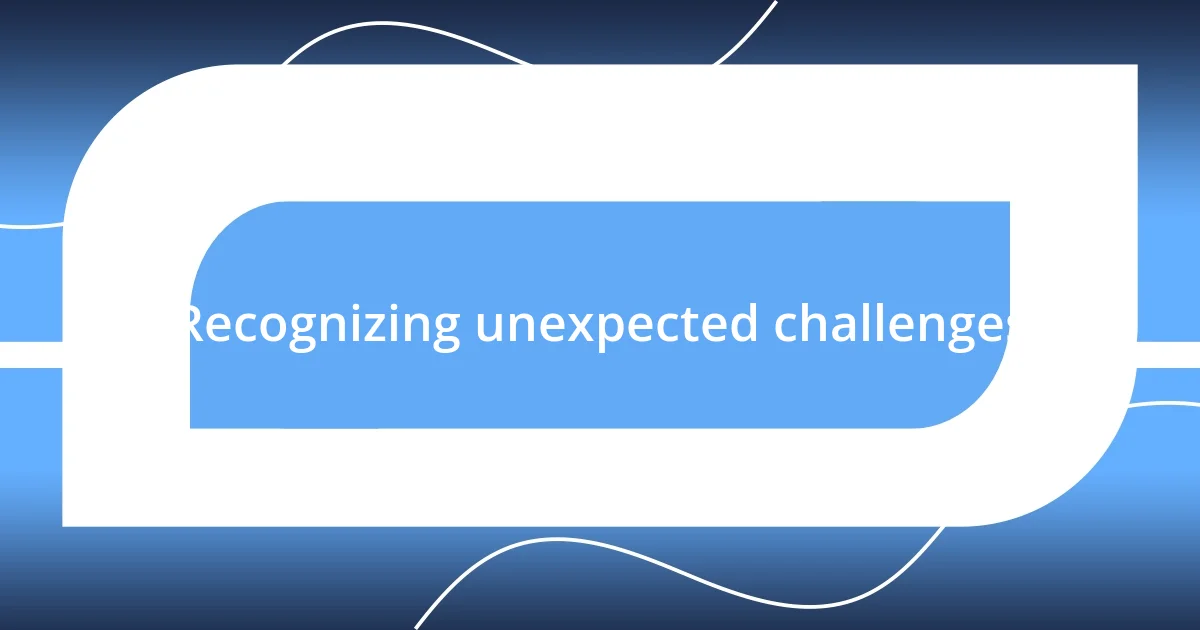
Recognizing unexpected challenges
Sometimes, unexpected challenges hit us like a sudden storm. I remember one day when my carefully planned project at work took an abrupt turn due to unforeseen changes in our team’s objectives. I felt that familiar lump in my throat, but I realized that recognizing these challenges early on was crucial; they often come disguised as mere inconveniences.
Think about times when you’ve faced surprises—didn’t they often catch you off guard? I’ve learned that the key to recognizing these challenges lies in being attentive, not just to what’s happening around us but also to our own feelings and instincts. For instance, during a personal crisis, I noticed subtle changes in my mood that hinted at looming difficulties. Embracing these signs allowed me to address the issues head-on before they snowballed.
What if we paused and reflected on the current situations in our lives? A recent project of mine exemplified this notion. Halfway through, unexpected feedback made me question everything. Instead of getting bogged down, I asked myself what I could learn from this challenge. Recognizing it early helped me pivot my approach and ultimately found a solution that exceeded expectations.
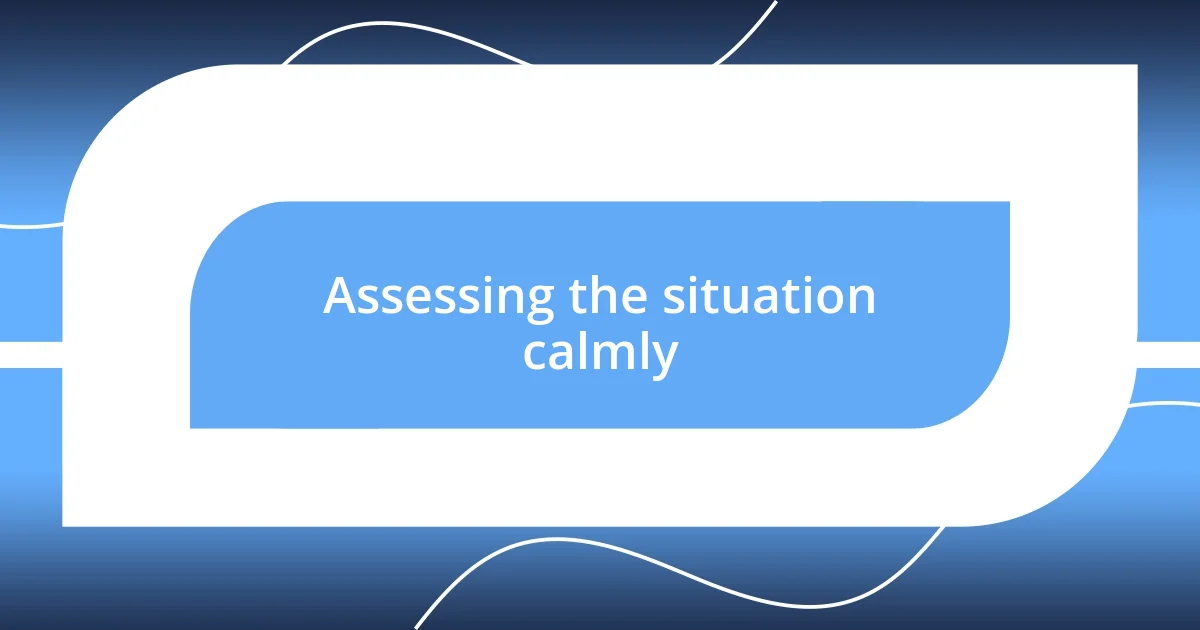
Assessing the situation calmly
Taking a step back to assess a situation calmly can make all the difference in how we respond to unexpected challenges. I remember a time I faced a sudden disruption during a family gathering—a power outage right in the middle of dinner. Instead of panicking, I took a deep breath and scanned the room. I realized that everyone was still together, sharing stories and laughter even in the dark. This helped me focus on the positives, leading me to suggest a spontaneous board game to keep the mood light and engaged.
Here are a few points to consider when assessing a challenging situation calmly:
- Pause and Breathe: Take a moment to breathe deeply, allowing yourself to regain composure before reacting.
- Gather Information: Observe the details around you. What exactly has changed? Gathering facts can provide clarity.
- Identify Emotions: Recognize your feelings. Acknowledging emotions helps in understanding your reaction and making more balanced decisions.
- Think Rationally: Shift from an emotional response to a logical assessment. Ask yourself what the core issue is and how it can be addressed.
- Seek Perspectives: Sometimes talking to others can provide insights you might have missed. A fresh pair of eyes can help frame the situation differently.
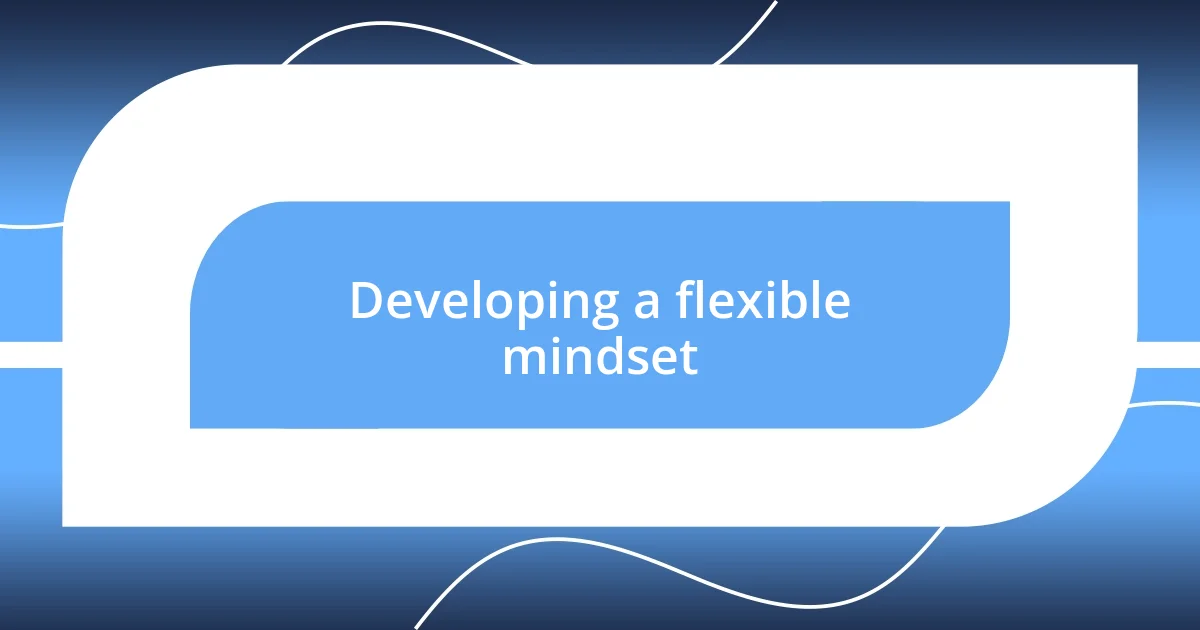
Developing a flexible mindset
Developing a flexible mindset is essential when navigating through life’s unexpected challenges. I vividly recall a moment in my career when a significant shift in project priorities forced me to adapt quickly. Instead of panicking, I embraced the opportunity to rethink my approach and involve my team in brainstorming. That flexibility not only salvaged the project but also strengthened our collaboration.
In my experience, fostering a flexible mindset starts with embracing change rather than resisting it. There have been times when my initial plan fell apart, triggering a sense of frustration within me. However, I learned to reframe those moments as invitations for growth. By asking myself how I could pivot rather than lament what was lost, I discovered new avenues that I hadn’t considered before. This shift in perspective allowed me to turn setbacks into stepping stones toward success.
Ultimately, adopting a flexible mindset can profoundly impact our ability to confront unforeseen challenges. I once faced a personal setback that derailed my travel plans. Instead of sulking, I decided to explore local spots I’d overlooked before. This unexpected adventure taught me that some of life’s best moments can emerge from changing course. By maintaining an adaptable attitude, we open ourselves up to new experiences and solutions that we might have otherwise missed.
| Fixed Mindset | Flexible Mindset |
|---|---|
| Avoids challenges | Embraces challenges |
| Gives up easily | Persists in the face of setbacks |
| Sees effort as fruitless | Sees effort as a path to mastery |
| Ignores feedback | Welcomes feedback for growth |
| Feels threatened by others’ success | Finds inspiration in others’ success |
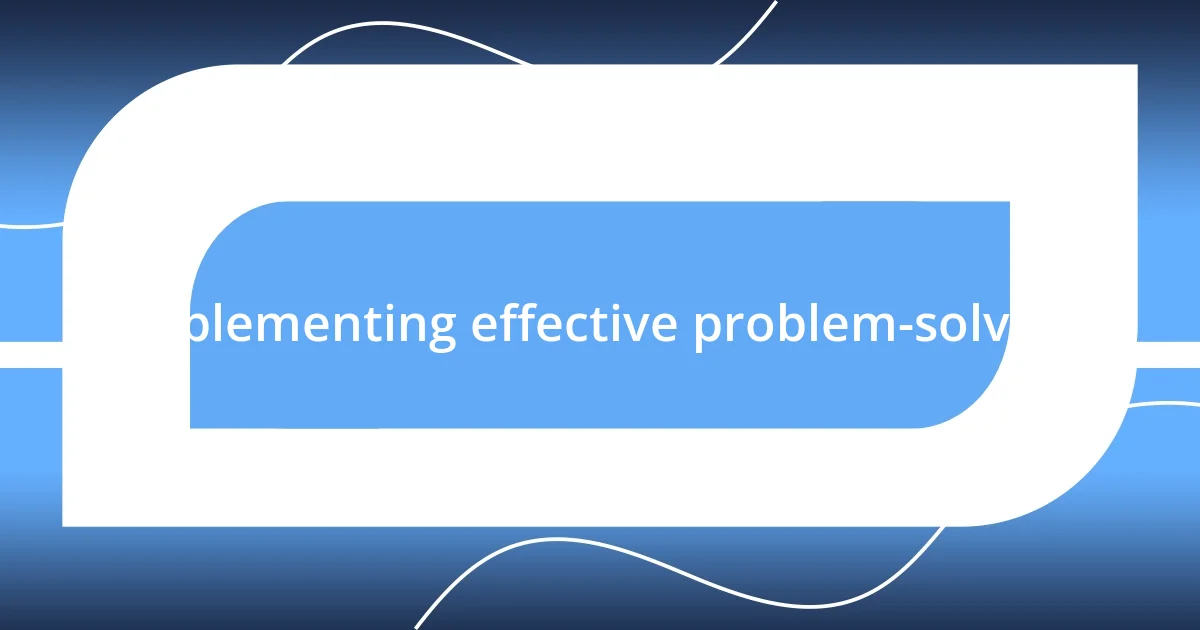
Implementing effective problem-solving
Implementing effective problem-solving involves a methodical approach to real challenges that arise unexpectedly. One time, during a critical work presentation, our main projector malfunctioned just moments before I was set to start. Instead of succumbing to panic, I quickly assessed the resources in the room. I spotted an additional screen and calmly shifted my strategy, connecting my laptop to the other display. The result? A seamless transition that not only salvaged the presentation but showed my team that adaptability can turn potential failures into successes.
I find that keeping the lines of communication open is crucial when tackling problems. In a challenging group project, differing opinions emerged regarding our final approach. I decided to facilitate a discussion, inviting everyone to voice their concerns and suggestions. It was enlightening to see how collaborative problem-solving transformed tension into teamwork. This experience reinforced my belief that sometimes, sharing the burden of a challenge not only eases individual stress but also fosters innovative solutions that might not have surfaced otherwise. Isn’t it fascinating how addressing a problem collectively can pave the way for unexpected breakthroughs?
Ultimately, I’ve learned that viewing challenges as puzzles to solve rather than insurmountable obstacles makes a world of difference. There was an instance when I faced a financial hiccup while planning a community event. Instead of letting the budget constraints overwhelm me, I turned to local businesses for support. This not only alleviated the financial burden but also forged relationships within the community. Reflecting on that moment, I realized that the very act of problem-solving not only builds resilience but also connects us to others in ways we can’t always predict. How often do we miss opportunities simply because we’re intimidated by the challenge at hand?
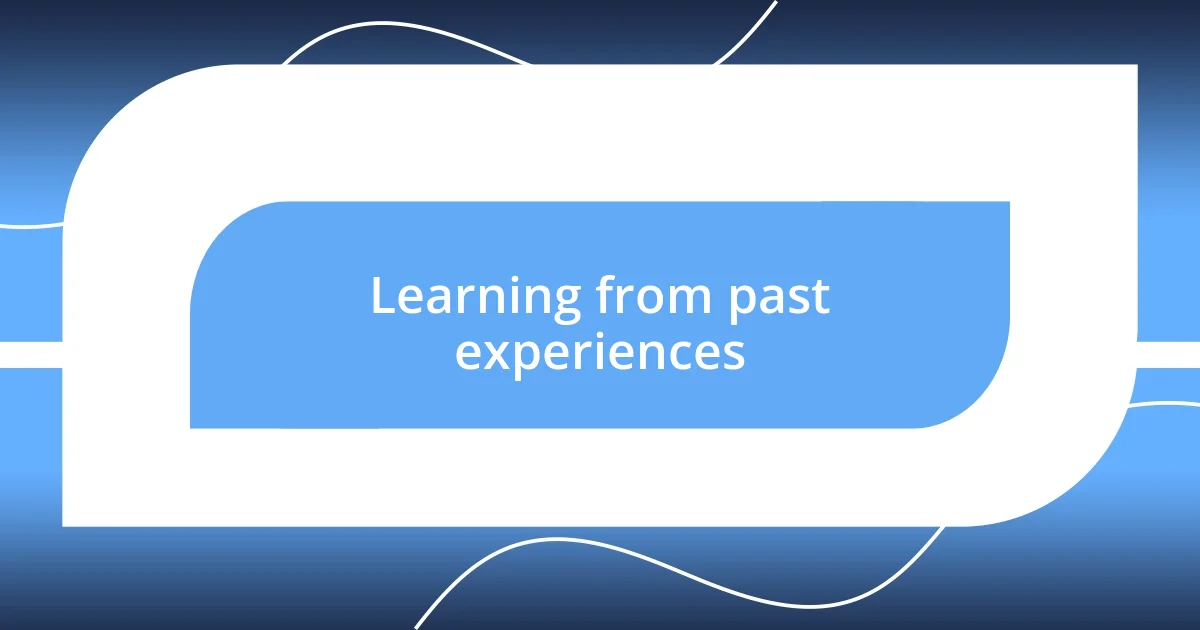
Learning from past experiences
Learning from past experiences has been a cornerstone of my personal growth. I remember a time when I underestimated the complexity of a project, thinking I could handle it all on my own. When things spiraled out of control, I was forced to reach out for help. That experience taught me the importance of collaboration and recognizing my own limitations. I realized that sharing the load not only lightens the stress but leads to richer ideas and solutions. Isn’t it interesting how much we can learn about teamwork through our missteps?
Looking back, I’ve noticed that some of my biggest lessons came from failures rather than successes. For instance, there was a period when I launched a product that simply didn’t resonate with the audience. Instead of dwelling on the disappointment, I gathered feedback directly from users. Their insights opened my eyes to what was missing and allowed me to refine our offerings in meaningful ways. The emotional weight of that failure eventually transformed into a motivating force. Don’t you think it’s amazing how a setback can spark new understanding and drive?
One of the most valuable things I’ve learned is to approach past challenges with curiosity rather than regret. I often reflect on how I handled a difficult team dynamic during a high-stakes project. Initially, I reacted defensively to criticism, but in retrospect, that moment taught me the importance of being open to constructive feedback. Embracing those uncomfortable conversations not only improved our project but also strengthened team bonds. Have you ever found that stepping back from a tough experience can lead to surprising clarity about how to tackle future challenges?
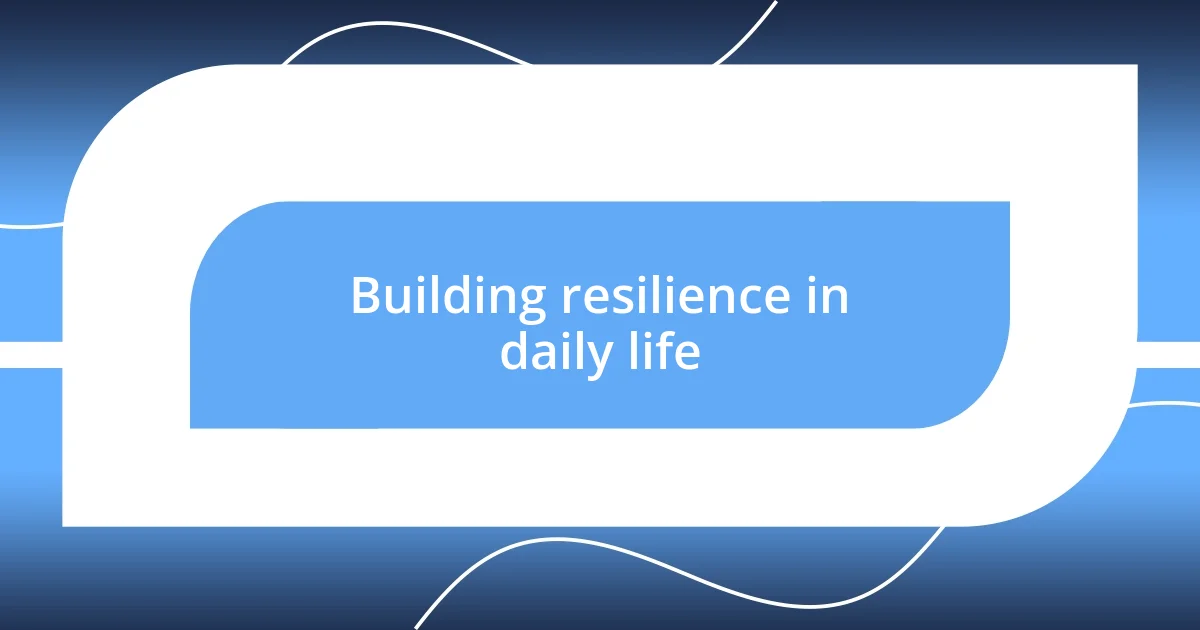
Building resilience in daily life
Building resilience in daily life involves embracing daily challenges with an open mind. I remember a particular week when everything seemed to go wrong at once: a family member fell ill, my car broke down, and work deadlines loomed ominously. Instead of feeling crushed by the weight of everything, I chose to focus on one task at a time. This method not only helped me stay grounded but also reminded me that resilience often comes from breaking larger obstacles into smaller, more manageable steps. Have you ever found that tackling one issue at a time makes overwhelming situations more bearable?
Practicing self-care is another essential aspect of building resilience. I’ve had days where stress felt paralyzing, and I realized that I needed to recharge my mental batteries. One evening, I took a long walk in nature; the fresh air and changing scenery did wonders for my mood. It’s fascinating how stepping away can offer fresh perspectives. When I returned to my challenges, I was surprised at how much more equipped I felt to handle each issue. Don’t you think it’s remarkable how a little self-care can reset our mindset?
Staying connected to supportive people in your life can also fortify your resilience. There was a tough period when I felt isolated due to work pressures and personal struggles. It took a heartfelt phone call with a friend to remind me how important it is to lean on others. As we reminisced about good times and shared our current dilemmas, I found strength in knowing I wasn’t alone in facing life’s challenges. This experience taught me that cultivating these connections not only uplifts us during hard times but enriches our daily lives. Have you ever felt that a simple conversation could shift your entire outlook?
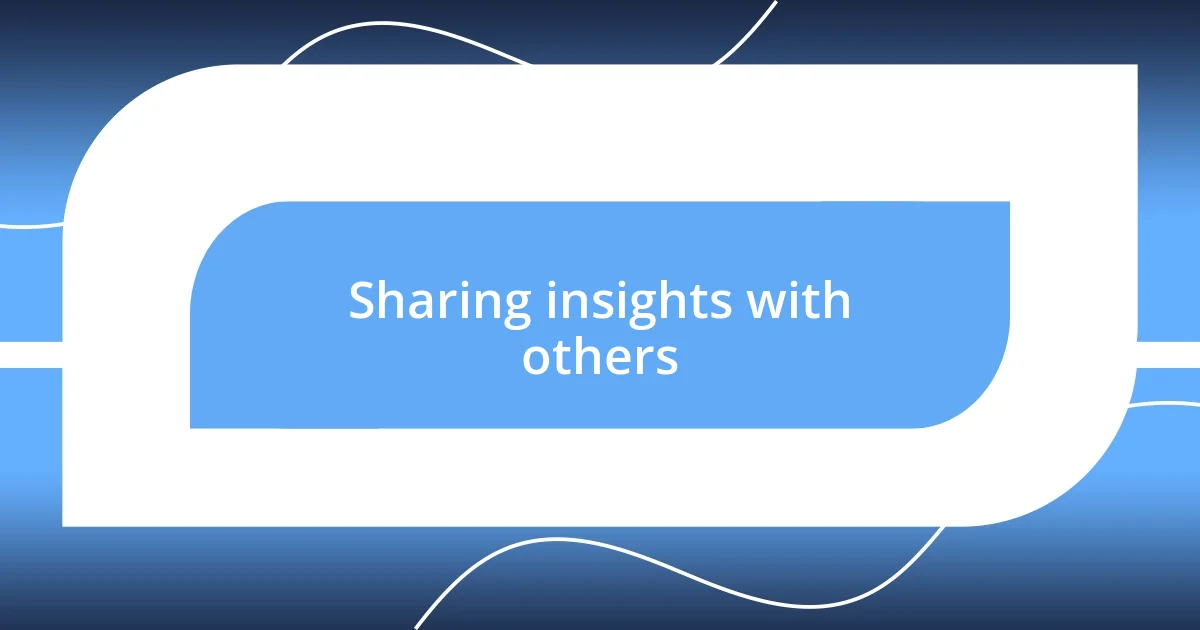
Sharing insights with others
When it comes to sharing insights with others, I’ve often found it to be a rewarding experience. A few months ago, I led a workshop where participants discussed their unexpected challenges. Hearing their stories made me realize we all face similar struggles, and sharing those experiences allowed us to learn from one another. I still vividly remember one participant describing how a miscommunication at work led to a major breakthrough when she asked her team for feedback. It struck me how a simple act of vulnerability can foster stronger connections. Have you ever noticed how openly sharing experiences can create a sense of community?
I recall another instance when I mentored a colleague who was grappling with imposter syndrome. As we talked, I shared my own battles with self-doubt and the lessons I learned from them. That conversation felt like a release, not just for both of us, but also as an opportunity to build a richer understanding of our worth. It amazed me how being honest about my experiences helped her find her courage. Have you ever found that sharing your own vulnerabilities can empower others to do the same?
On a lighter note, reflecting on past challenges over coffee with friends has become a cherished ritual for me. Just last week, we gathered to recount our funniest fails—the misadventures in navigating work-life balance, for instance. The laughter that erupted as we shared those moments lightened the mood. It reminded me that even when things don’t go as planned, viewing them through the lens of humor makes challenges a little easier to bear. Isn’t it incredible how sharing insights can turn a tough moment into a shared memory?






